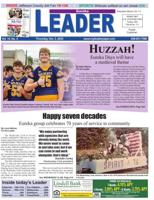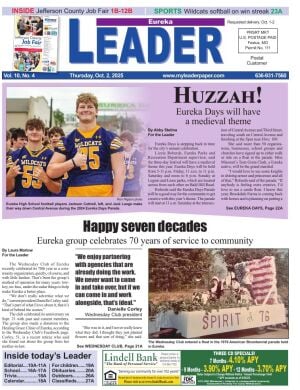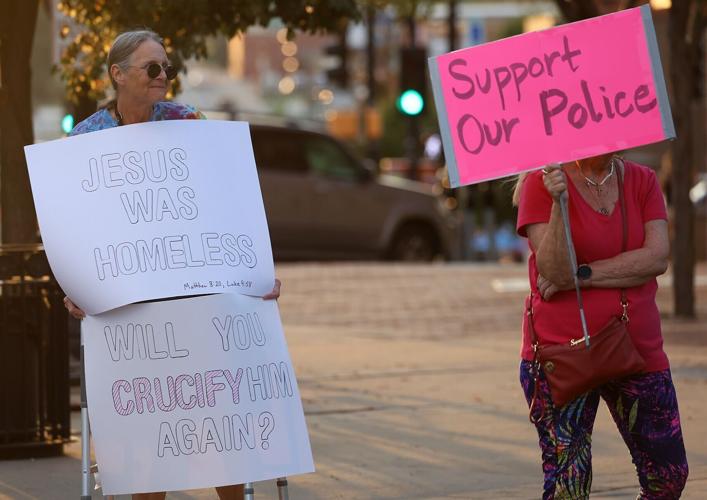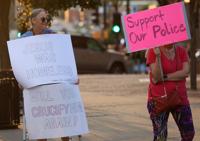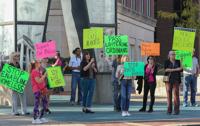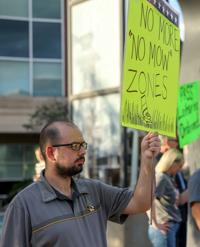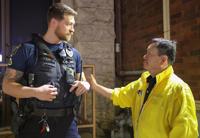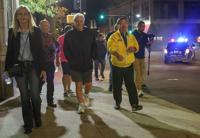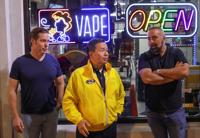University leaders, city officials and residents are divided on how to best address a rise in crime in Columbia.
A Sept. 27 shooting on Broadway that killed one and injured two spurred a conversation about crime downtown. Columbia Police Chief Jill Schlude said that total crime is up by almost 15% citywide this year at Monday night’s Columbia City Council meeting.
Following the shooting, UM System President Mun Choi called on city and county leaders to take immediate action regarding safety downtown. He observed downtown activity during an overnight walk-through this weekend.
Two groups also protested ahead of the City Council meeting, which included discussion of public safety.
Choi walks through downtown
Joined by about a dozen community members, many of whom live or work downtown, Choi walked through downtown late Saturday night and early Sunday morning to “find out directly with (his) own eyes what is happening in downtown.”
The walk began at 11:30 p.m. Saturday, and by then, law enforcement officers — Columbia Police Department, University of Missouri Police Department, Missouri State Highway Patrol and the Boone County Sheriff’s Office — populated most of downtown.

UM System President Mun Choi walks north on Ninth Street on Saturday in downtown Columbia. Police Chief Jill Schlude said there were 27 law enforcement officers downtown on Friday and Saturday.
In a Monday evening news release outlining police activity Friday and Saturday, the Columbia Police Department said 27 law enforcement officers across the four agencies were downtown each night. It said officers located and returned firearms to 20 people who were stopped by police Friday night.
“I think the community would be surprised by the amount of firearms that were being legally carried downtown this weekend,” Assistant Police Chief Mark Fitzgerald said in the release.
Additionally, an officer arrested a convicted felon who was in possession of a semiautomatic rifle, according to the release. The individual was involved in a downtown shooting in 2019.
Choi acknowledged that there were more law enforcement officers downtown this weekend, and he said the increased patrol from local agencies is necessary.
“We want to work together — the university, business leaders, citizens and city leaders — to improve public safety, but it is very important to acknowledge that we have a problem,” Choi said during the walk.

UM System President Mun Choi talks to officer Dalton Alvey on Saturday at Field House in downtown Columbia. “It is a complex issue, and when people talk about law enforcement and crime and accountability, they bring up root causes. They bring up disparities,” Choi said. “And I believe that those issues that our society, our community and civic leaders are addressing or attempting to address.”
Choi also discussed homelessness throughout his walk-through, saying it is a problem downtown. One of his first stops late Saturday night was next to a person sleeping in an alley off Ninth Street.
“Aren’t there beds available like Room at the Inn? I understand that there are a lot of services available ... " Choi said. “They have an Airbnb right here,” motioning across the alley after another member of the group pointed it out.
Throughout his course, some passersby stopped to thank Choi for addressing downtown crime, and others made quiet comments that the walk was “performative.”

From left, Community Improvement District member Russell Boyt, UM System President Mun Choi and Flat Branch founder Jim Yankee talk before their walk around downtown on Saturday outside Essentialz. Boyt and Yankee both participated in the walk to bring up problems they have noticed and led Choi through downtown.
Boone County Prosecuting Attorney Roger Johnson joined Choi on the walk, and Columbia Police Chief Jill Schlude briefly stopped by at the beginning. None of the City Council members or Boone County commissioners were in attendance.
Valerie Carroll, the councilperson representing the First Ward, which includes downtown, said in a Facebook post ahead of the walk that she would not be attending.
“While I share many of the concerns that were outlined in Dr. Choi’s letter, I can’t help but notice that many of the recommendations made in recent days are focused on homelessness and property crime, but do not effectively address the issue of gun violence,” Carroll said in the post.
Choi said he plans to do additional walk-throughs in the future.
Community responds to city leaders
Two groups of protesters demonstrated outside of the Daniel Boone City Building on Monday evening in response to the ongoing conversation about public safety and homelessness.

Margaret McConnell, left, and Sue McMichael hold up signs in protest on Monday in downtown Columbia. McConnell was protesting the portrayal of people who are homeless amid recent concerns over safety. McMichael was among a group of demonstrators protesting various issues including tax increases, vagrancy and safety in Columbia.
At the first demonstration, which started at 5 p.m., protesters spoke of their disapproval of how the city is handling public safety and a general lack of support of law enforcement.
“It’s like we haven’t been good parents,” Columbia resident Cindy Minchew said in response to crime in Columbia. “You’re just letting your kids run wild … the City Council needs to do better at leading.”
About two dozen people protesting waved signs at passing cars. Some motorists honked in support of the demonstration, while others yelled disapproval.

Brandon Rice holds a sign during a protest on Monday at the Daniel Boone City Building in downtown Columbia. Rice said that increasing police presence is not the only solution for decreasing gun violence in Columbia.
Much of the recent dialogue about public safety in the city has touched on homelessness, especially as community leaders weigh in.
The second demonstration, which started at 7 p.m., protested the lack of city support for homeless people.
“Instead of actually addressing a problem in a constructive way, we’re scapegoating a bunch of people who have little to no resources and cannot speak for themselves,” Columbia resident Jennifer Parsons said. Parsons was one of about 15 people at the second demonstration.

Demonstrators protest against various issues on Monday at the Daniel Boone City Building in downtown Columbia. The protest drew in various community members.
Many of the protesters called for increased city support of the homeless population in Columbia.
“You don’t solve this problem by cracking down on people,” Columbia resident Truman Oaks said. “You solve it by lifting them up.”
City Council talks crime rates
Mayor Barbara Buffaloe began Monday’s City Council meeting by asking Schlude to speak about crime.
Total crime is up 14.7% citywide year-to-date compared to last year, Schlude said. Proactive policing has increased the number of arrests related to "drug use and possession, trespassing, weapons offenses where there is no victim ..., liquor law violations," according to Schlude.
Schlude said the Police Department noticed an uptick in crime, prompting them to pull data at the start of the summer. The analysis showed a vast majority of crime occurring after bar closing time and a “crime hotspot” around Eighth Street.
“We recognized we had had some issues with increasing violence, specifically guns in the downtown area,” she said.
This led the Police Department to start stationing more officers downtown this summer. On July 1, Schlude added eight officers to the overnight policing efforts.
Among her updates, Schlude also touched on factors influencing crime downtown. She said the number of people carrying weapons in the area creates a heightened sense of danger for the police force.
She also noted that due to vacancies, the Police Department might not be able to fully staff a downtown unit until May. The force currently aims to staff 16 officers per shift, with more officers being added to patrol downtown on busy nights.
City Council members also shared their thoughts about the response to the Sept. 27 shooting and violence prevention strategies at Monday’s meeting.
Buffaloe thanked Schlude for the Police Department’s work at curbing crime.
“We’re responding to community issues, not just downtown issues,” she said.
Buffaloe said she plans to utilize existing boards and commissions to respond to the increase in crime, rather than creating a new task force. She also expressed interest in continuing to collaborate with university leaders.
Second Ward councilperson Vera Elwood also shared her thoughts on the homeless population, gun violence and traffic and pedestrian safety being conflated when discussing the cause of the uptick in violence.
“These three issues are all seen downtown because of high population density and high traffic nightlife destinations," she said. "That does not mean they in any way cause each other, and it does not mean they can be fixed by the same solutions."
Carroll also expressed frustration for the increase in violence and the politicization of the shooting.
“What worries me is the politicization in the wake of a tragedy and (the) harm that does to the communities that are already affected by gun violence, and my fear is that it furthers the divide,” Carroll said.
Third Ward councilperson Jacque Sample spoke on recent public discourse.
“When people are scared, they sometimes act in survival mode,” Sample said. “But I urge our community to resist to act on fear in ways that displace or project anger onto the wrong targets. In my opinion, our anger belongs squarely with those who choose to commit crimes that harm our citizens.”
Brendan Berger, Kalli Fowler and Lola Jahant contributed reporting.
